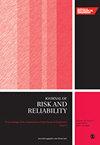阻尼器性能退化和轨迹演化下的车辆动力学失效时间预测
IF 1.8
4区 工程技术
Q3 ENGINEERING, INDUSTRIAL
Proceedings of the Institution of Mechanical Engineers Part O-Journal of Risk and Reliability
Pub Date : 2023-10-28
DOI:10.1177/1748006x231202289
引用次数: 0
摘要
铁路车辆在长期运行过程中,会经历减振器性能退化和轨道演化,两者都对车辆的动力学性能产生重大影响。本研究旨在建立考虑两个随机因素时车辆系统动力学失效时间的数学模型。在方法上,采用维纳过程建立了阻尼器退化模型。此外,采用连续时间马尔可夫链来描述轨道不规则性的状态交易。此外,采用蒙特卡罗方法对随机参数下车辆的动力响应进行采样。最后,利用贝叶斯理论建立了Dirichlet过程先验条件下Weibull混合物的可靠性模型。数值算例表明,阻尼器的个体差异直接影响车辆动力学性能的退化速度。此外,不同指标之间存在正相关关系,混合模型由较少的分量组成,威布尔混合近似于失效时间的分布。与其他阻尼器相比,抗偏航阻尼器对车辆系统动力学的影响更为显著。结果表明,各类阻尼器均可采用统一的更换周期,而抗偏航阻尼器应加强监测。本文章由计算机程序翻译,如有差异,请以英文原文为准。
Failure time prediction for vehicle dynamics under performance degradation of dampers and track evolution
During long-term service, railway vehicles will experience damper performance degradation and track evolution, both have significant effects on the vehicle dynamics performance. This study aims to develop a mathematical model for assessing the failure time of the vehicle system dynamics when considering two random factors. As for the methodology, Wiener processes are used to propose a damper degradation model. Moreover, a continuous-time Markov chain is adopted to describe the state transaction of the track irregularities. In addition, the Monte Carlo method is employed to sample the dynamic responses of the vehicle using stochastic parameters. Finally, the Bayesian theory is utilized to establish the reliability model of the Weibull mixtures under the Dirichlet process prior. The results are obtained through a numerical example: the dampers’ individual differences directly affect effect on the rate of degradation of the vehicle dynamics performance. Furthermore, different indexes positively correlate with each other, mixture models are composed of a small number of components, and Weibull mixtures closely approximate the distribution of the failure time. Compared to other dampers, the anti-yaw dampers have a more significant impact on the vehicle system dynamics. Other results show that each type of damper can adopt a uniform replacement period whereas anti-yaw dampers should be more effectively monitored.
求助全文
通过发布文献求助,成功后即可免费获取论文全文。
去求助
来源期刊

Proceedings of the Institution of Mechanical Engineers Part O-Journal of Risk and Reliability
ENGINEERING, MULTIDISCIPLINARY-ENGINEERING, INDUSTRIAL
CiteScore
4.50
自引率
19.00%
发文量
81
审稿时长
6-12 weeks
期刊介绍:
The Journal of Risk and Reliability is for researchers and practitioners who are involved in the field of risk analysis and reliability engineering. The remit of the Journal covers concepts, theories, principles, approaches, methods and models for the proper understanding, assessment, characterisation and management of the risk and reliability of engineering systems. The journal welcomes papers which are based on mathematical and probabilistic analysis, simulation and/or optimisation, as well as works highlighting conceptual and managerial issues. Papers that provide perspectives on current practices and methods, and how to improve these, are also welcome
 求助内容:
求助内容: 应助结果提醒方式:
应助结果提醒方式:


